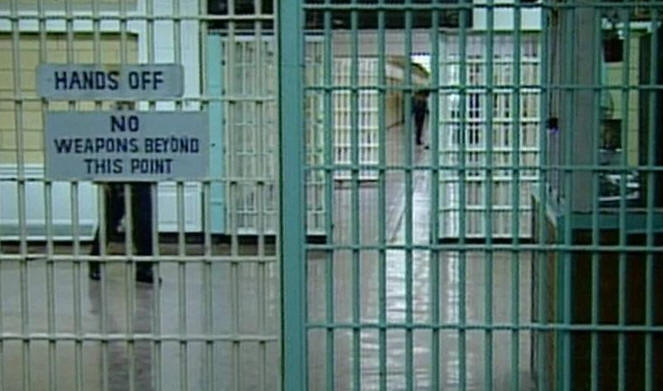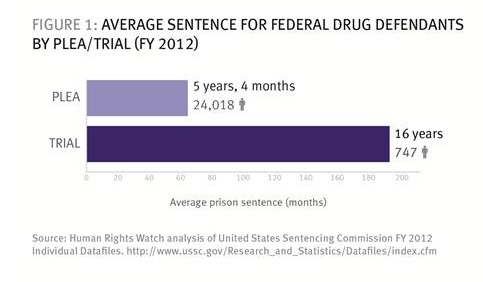JUSTICE DENIED
IN THE AGE OF PLEA BARGAINS AND MASS INCARCERATION,
INNOCENCE IS OFTEN IRRELEVANT

Today our justice system bears little resemblance to what the Founding Fathers intended. The United States has around 2 million people incarcerated. The "land of the free" has more people behind bars per capita than any other nation on Earth.
In this article, we have information about both federal and state prosecution. However, the statistics of what happens on the federal level are easier to study because often the statistics on these matters are more readily available.
A critical element of the American justice system is supposed to be the right to a trial, to prove innocence or guilt. Yet a large number of incarcerated people have not even had the chance to prove their innocence. Every year, 641,000 people walk out of prison gates, but people go to jail over 11 million times each year. Jail churn is particularly high because most people in jails have not been convicted. Some have just been arrested and will make bail in the next few hours or days, and others are too poor to make bail and must remain behind bars until their trial. (Prison Policy).
Most criminal cases (as many as 90%) do not even go to trial. They are settled by plea bargain. A 2012 New York Times article reported that 97% of federal cases and 94% of state cases end via plea bargain.
And as many as 97% of federal drug offenders plead guilty, whether they are guilty or not. There is a tremendous amount of pressure from prosecutors upon defendants to accept a plea bargain in lieu of trial, and defendants are often threatened with severe sentencing if they don't agree (sometimes even life without parole).
In the rare cases in which defendants insist on going to trial, prosecutors make good on their threats. Federal drug offenders convicted after trial receive sentences on average three times as long as those who accept a plea bargain, according to statistics released in a Human Rights Watch Report.
Jamie Fellner, senior advisor to the US Program at Human Rights Watch said the following: “Prosecutors give drug defendants a so-called choice – in the most egregious cases, the choice can be to plead guilty to 10 years, or risk life without parole by going to trial. Prosecutors make offers few drug defendants can refuse. This is coercion pure and simple.”
In the 1980s, Congress enacted mandatory minimum sentencing statutes. Lawmakers intended 10-year minimum sentences for drug kingpins and five years for mid-level traffickers. But because the laws key the sentence to the weight and type of drug, and not the specific role of the offender, prosecutors can levy the same charges with the same mandatory sentence against a courier who delivers a package of drugs and the head of a drug organization to whom the drugs are delivered. Nearly half – 48 percent – of federal drug defendants have low-level functions such as street-level dealer or courier, and half to three-quarters of them are convicted of offenses carrying mandatory minimum sentences (Human Rights Watch).
Prosecutors pressure defendants to plead guilty by threatening increased mandatory sentencing enhancements and penalties that are applicable if the defendant has one or more prior drug convictions or possessed a gun at the time of the offense. If the prosecutors carry out their threats, they add decades to the defendant’s time behind bars, resulting in punishments that, as one federal judge, John Gleeson of New York’s Eastern District, said, are “so excessively severe they take your breath away.”
Under Title 21, Section 841(b)(1), for example, prosecutors have complete discretion in deciding whether to mention prior felony convictions in connection with a drug offender's sentencing, which can have a jaw-dropping impact on the penalty he receives: If a prosecutor decides to notify the court of one prior conviction, the defendant’s sentence will be doubled. If the prosecutor decides to notify the court of two prior convictions for a defendant facing a 10-year mandatory minimum sentence on the current offense, the sentence increases to life.
Particularly disturbing is the case of Sandra Avery, a small-time drug dealer who possessed 50 grams of crack cocaine with the intent to deliver. When she rejected a plea of 10 years for the right to take her case to trial, the prosecutor triggered a sentencing enhancement based on her prior convictions for simple drug possession, and she was sentenced to life without parole.
“Going to trial is a right, not a crime,” Fellner said. “But defendants are punished with longer sentences for exercising that right.”

(Source: Human Rights Watch)
WORLD FUTURE FUND
Kamala Harris's Bail Reform Bill
A Vital Plan for Criminal Justice Reform
LAWS
Under this law, prosecutors have complete discretion in deciding whether to mention prior felony convictions in connection with a drug offender's sentencing, which can have a jaw-dropping impact on the penalty he receives: If a prosecutor decides to notify the court of one prior conviction, the defendant’s sentence will be doubled. If the prosecutor decides to notify the court of two prior convictions for a defendant facing a 10-year mandatory minimum sentence on the current offense, the sentence increases to life.
ORGANIZATIONS
Human Rights Watch The Sentencing Project Prison Policy Initiative Pretrial Justice Institute
NEWS STORIES
Mass Incarceration: The Whole Pie 2017 (Prison Policy Initiative, 3-14-17)
The American criminal justice system holds more than 2.3 million people.
Innocence Is Irrelevant (The Atlantic September 2017)
This is the age of the plea bargain—and millions of Americans are suffering the consequences.
Why Innocent People Plead Guilty (New York Book Reviews, November 20, 2014)
The criminal justice system in the United States today bears little relationship to what the Founding Fathers contemplated, what the movies and television portray, or what the average American believes.
Almost Half a Million People Are in Jail Awaiting Trial (The Nation, 12-5-16)
How the practice of bail is making us less safe.
Our Bail System Is Leaving Innocent People To Die In Jail Because They’re Poor (Huffington Post, 7-14-16)
When freedom is only available to those who can afford it, many end up paying with their lives.
State vs. Federal Presecution (Nolo)
Some crimes violate both state and federal law, enabling both governments to bring criminal charges.
FEDERAL
An Offer You Can't Refuse - Human Rights Watch (REPORT)
How U.S. Federal Prosecutors Force Drug Defendants to Plead Guilty
US: Forced Guilty Pleas in Drug Cases (Human Rights Watch, 12-5-13)
Threat of Draconian Sentences Means Few Willing to Risk Trial
Why 97% of Federal Drug Offenders Plead Guilty (Forbes, 12-8-13)
The percentage of criminal cases ending in plea bargains has increased during the last few decades
as mandatory minimum sentencing laws have raised the potential penalty for going to trial.